Japan’s Prime Minister Shinzo Abe declared a month-long state of emergency Tuesday for Tokyo and six other prefectures to ramp up defenses against the spread of the coronavirus.
Abe said Tuesday that there would be no European-style lockdowns. The state of emergency will only permit Tokyo Gov. Yuriko Koike and heads of six other designated prefectures to do more to reinforce calls for social distancing. Virtually all of those measures will be requests that cannot be enforced with penalties for violations.
The COVID-19 outbreak is now rampant and rapidly spreading, threatening people's health, their daily lives and the economy. Abe said he planned to keep the state of emergency in place for a month, until May 6.
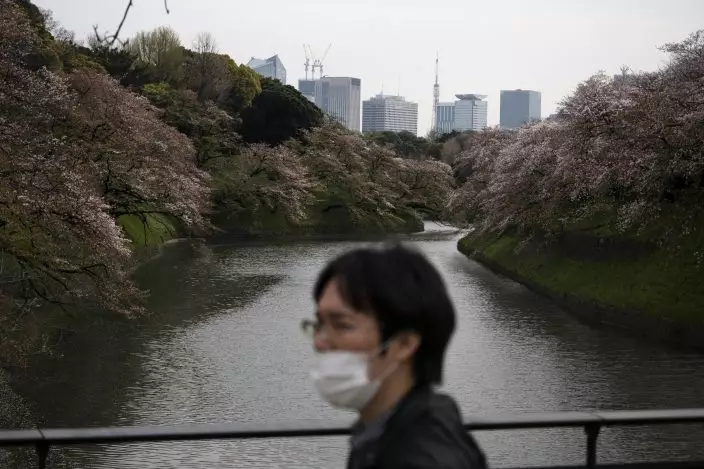
A man with a mask walks past Chidorigafuchi moat lined with blossoming cherry trees Tuesday, April 7, 2020, in Tokyo. Japanese Prime Minister Shinzo Abe said that he will declare a state of emergency for Tokyo and six other prefectures as early as Tuesday to bolster measures to fight the coronavirus, but that there will be no hard lockdowns. (AP PhotoJae C. Hong)
The announcement follows surges in new cases in Tokyo, including consecutive rises exceeding 100 over the weekend. By Monday there were 1,116 confirmed cases in the metropolitan region of 14 million people. Nationwide, Japan has 3,906 confirmed cases, as well as a 712 from a cruise ship quarantined at Yokohama port near Tokyo, with 91 deaths.
Abe has been under pressure to declare a state of emergency to get better compliance with calls for social distancing as rising cases where there was no known contact with another patient led experts to say an alarming explosion in infections could overwhelm health care systems.
Tokyo Gov. Yuriko Koike welcomed the emergency measures, saying that because they are legally valid and involve coordinated action with the central government, she expects they “will prevail widely and deeply among the people."
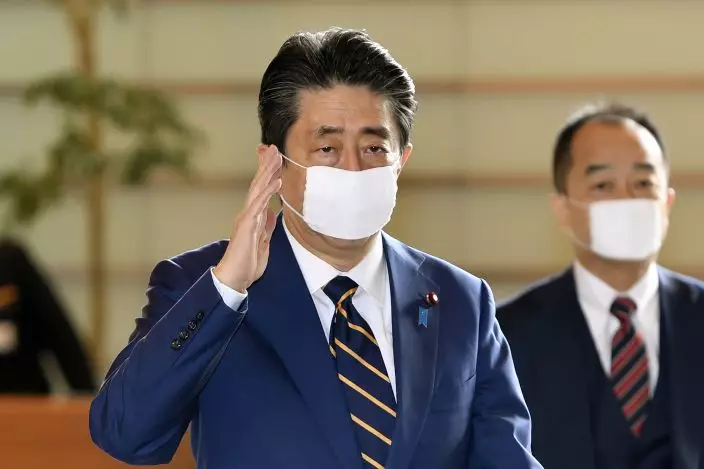
Japanese Prime Minister Shinzo Abe arrives at his official residence in Tokyo Tuesday, April 7, 2020. Abe said that he will declare a state of emergency for Tokyo and six other prefectures as early as Tuesday to bolster measures to fight the coronavirus outbreak, but that there will be no hard lockdowns. (Yoshitaka SugawaraKyodo News via AP)
Japan's limits on official action during a state of emergency stem from its experience with repression and disasters stemming from fascist governments before and during World War II. The public is doubly wary due to the push by Abe's ultra-conservative ruling party and its supporters for a Constitutional amendment to include a state of emergency clause for disaster and wartime contingencies.
Abe's government is thought to have delayed declaring a state of emergency out of fear of how it might hurt the economy. But as fear of the pandemic has grown, the public and medical experts have increasingly supported taking more drastic action.
Abe repeatedly has said a hard lock down, like in Italy and France where nobody is supposed to be outside for nonessential reasons, is not envisaged for Japan. “We can only make a request, but it’s different from lock downs enforced in France and other countries," he said last week.
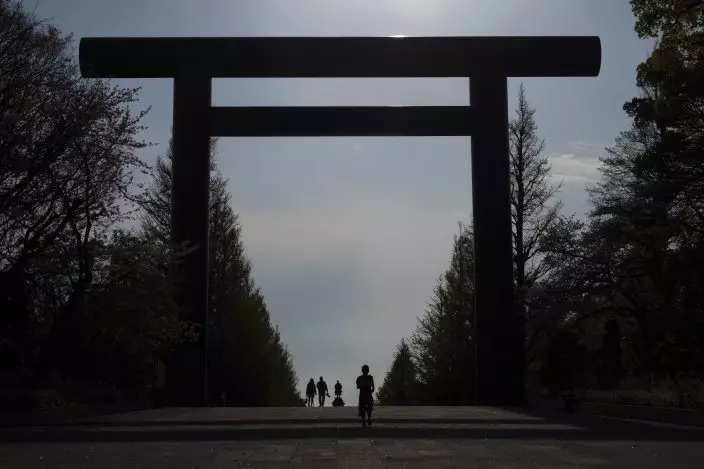
People are dwarfed by a torii gate at Yasukuni Shrine Tuesday, April 7, 2020, in Tokyo. Japanese Prime Minister Shinzo Abe said that he will declare a state of emergency for Tokyo and six other prefectures as early as Tuesday to bolster measures to fight the coronavirus, but that there will be no hard lockdowns. (AP PhotoJae C. Hong)
Measures include: a stay-at-home request, guidance to schools on temporary closures and requests to close non-essential businesses and stores and to cancel or postpone events and exhibits. Violators cannot be penalized unless they fail to comply with orders on providing or storing emergency relief goods, such as surgical masks and medical equipment.
Still, the state of emergency could significantly limit movement of people around and out of the city. Takahide Kiuchi, an economist at Nomura Research Institute, said in a recent report that a state of emergency could cause consumer spending to fall nearly 2.5 trillion yen ($23 billion) , leading to a 0.4% drop in Japan’s annual GDP.
The government enacted a special law last Month enabling Abe to declare a state of emergency. The law, however, is divisive given concerns over risks to civil rights.
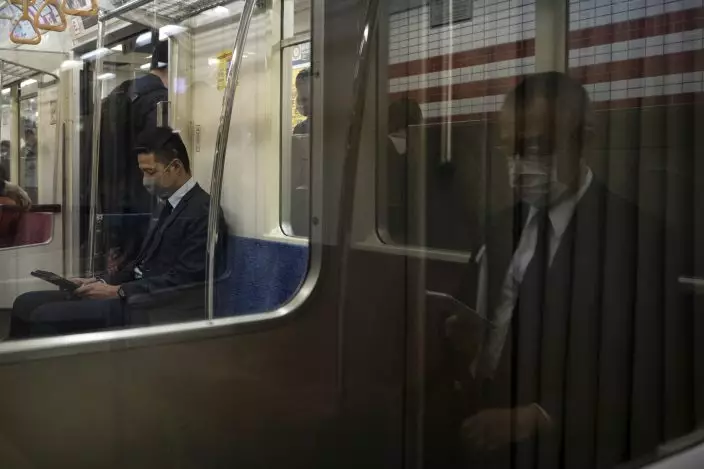
Commuters ride a train Tuesday, April 7, 2020, in Tokyo. Japanese Prime Minister Shinzo Abe said that he will declare a state of emergency for Tokyo and six other prefectures as early as Tuesday to bolster measures to fight the coronavirus, but that there will be no hard lockdowns. (AP PhotoJae C. Hong)
The state of emergency comes less than two weeks after Koike, the Tokyo governor, raised the alarm over an acceleration of infections in the Japanese capital.
Earlier, it was thought that Japan had curbed infections by closely monitoring clusters of cases and keeping them under control, rather than conducting massive testing as was done in neighboring South Korea. That strategy appears to be failing given the sharp rise in cases not linked to previous known infections.
As is true in many places, there are concerns over shortages of beds and ICU units for patients with severe symptoms.
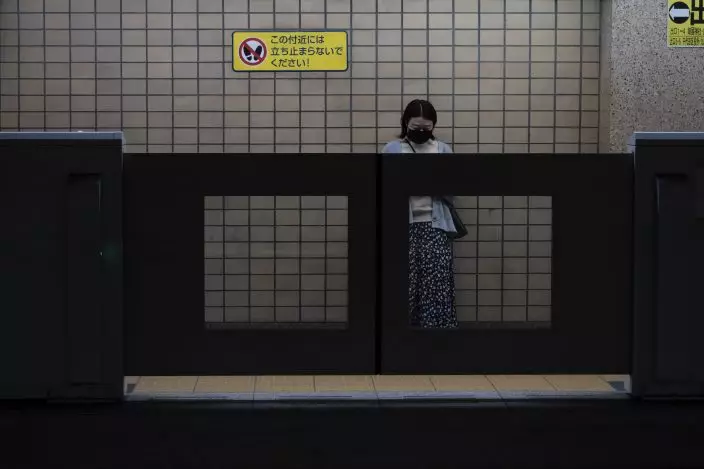
A woman wearing a face mask waits for a train to arrive Tuesday, April 7, 2020, in Tokyo. Japanese Prime Minister Shinzo Abe said that he will declare a state of emergency for Tokyo and six other prefectures as early as Tuesday to bolster measures to fight the coronavirus, but that there will be no hard lockdowns. (AP PhotoJae C. Hong)
Osamu Nishida, chairman of the Japanese Society of Intensive Care Medicine, noted that Japan has only five ICU beds per 100,000 people, compared to 12 in Italy and about 30 in Germany.
Abe said last Friday that the central government has secured 25,000 beds and 8,000 ventilators. The health ministry also eased hospitalization requirements for patients with no symptoms or only slight illnesses, allowing their transfer to hotels and other designated lodgings where they can be monitored by medical workers. That should free up beds for the severely ill, helping ease the strain on the medical system.
Follow Mari Yamaguchi on Twitter at https://www.twitter.com/mariyamaguchi


